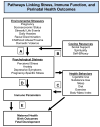Psychoneuroimmunology in pregnancy: immune pathways linking stress with maternal health, adverse birth outcomes, and fetal development
- PMID: 21787802
- PMCID: PMC3203997
- DOI: 10.1016/j.neubiorev.2011.07.005
Psychoneuroimmunology in pregnancy: immune pathways linking stress with maternal health, adverse birth outcomes, and fetal development
Abstract
It is well-established that psychological stress promotes immune dysregulation in nonpregnant humans and animals. Stress promotes inflammation, impairs antibody responses to vaccination, slows wound healing, and suppresses cell-mediated immune function. Importantly, the immune system changes substantially to support healthy pregnancy, with attenuation of inflammatory responses and impairment of cell-mediated immunity. This adaptation is postulated to protect the fetus from rejection by the maternal immune system. Thus, stress-induced immune dysregulation during pregnancy has unique implications for both maternal and fetal health, particularly preterm birth. However, very limited research has examined stress-immune relationships in pregnancy. The application of psychoneuroimmunology research models to the perinatal period holds great promise for elucidating biological pathways by which stress may affect adverse pregnancy outcomes, maternal health, and fetal development.
Copyright © 2011 Elsevier Ltd. All rights reserved.
Figures

References
-
- Alamilla SG, Kim BSK, Lam NA. Acculturation, enculturation, perceived racism, minority status stressors, and psychological symptomatology among latino/as. Hispanic J Behav Sci. 2010;32:55–76.
-
- Anderson NB. Racial-differences in stress-induced cardiovascular reactivity and hypertension - current status and substantive issues. Psychol Bull. 1989;105:89–105. - PubMed
-
- Anderson NB, McNeilly M, Myers H. A biopsychosocial model of race differences in vascular reactivity. In: Blascovich J, Katkin ES, editors. Cardiovascular reactivity to psychological stress & disease. American Psychological Association; Washington, D.C: 1993. pp. 83–108.
-
- Anisman H, Ravindran AV, Griffiths J, Merali Z. Endocrine and cytokine correlates of major depression and dysthymia with typical or atypical features. Mol Psychiatry. 1999;4:182–188. - PubMed
Publication types
MeSH terms
Grants and funding
LinkOut - more resources
Full Text Sources
Medical

